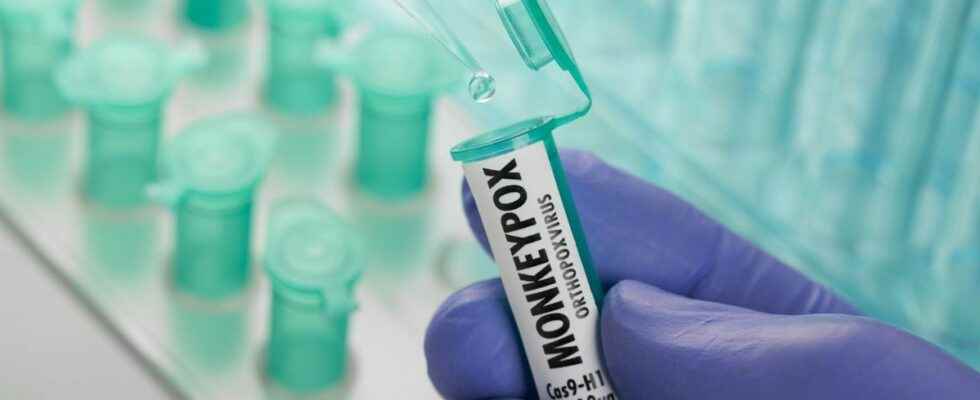Published on 05/25/2022 at 5:55 p.m.,
Reading 3 mins.
in collaboration with
Dr Gérald Kierzek (Medical Director of Doctissimo)
Research heats up as cases of monkeypox rise worldwide. A new study has demonstrated the effectiveness of a particular antiviral. But she also pointed out that the disease could stay in the body for up to 10 weeks…
Scientists are working hard on monkeypox, given the disease’s international spread and concern. Research is increasingly focusing on the specific characteristics of this virus and the therapeutic means to deal with it. A new study looked at the first cases of hospital transmission and household transmission outside of Africa.
Conducted on 7 patients infected with monkeypox in the UK between 2018 and 2021, the results suggest that:
- Some patients may be infected longer than expected;
- Certain antiviral medications might have the potential to shorten symptoms and reduce how long a patient is contagious.
A patient infected for 10 weeks
Scientists have found that the monkeypox virus remained in the body, specifically in the throat and blood, of a British patient for 76 days.
The man, in his 40s, had caught monkeypox in Nigeria, and was therefore still infected after 10 weeks. A duration that “surprised” the author of the study, British doctor Hugh Adler, of the Liverpool School of Tropical Medicine, who did not expect to find the virus in the patient’s throat and blood during as long as.
“Normally, the virus remains positive in the throat and blood throughout the duration of the illness and sometimes even a little longer after the rash”he explained.
Generally, patients with monkeypox are considered infectious as long as they show lesions characteristic of the disease. But these tend to heal and fall off after a few weeks. Doctor Hugh Adler explained that further research was needed to confirm whether or not the virus could be transmissible after the rash subsided.
According to him, there are no signs that patients are infectious after the skin symptoms have subsided. An idea, shared by Doctor Gérald Kierzek: “The fact that the patient still has the monkeypox virus in his body does not mean that it is contagious. Some hosts more weakened than others will more difficultly eliminate the virus”.
But for scientists, this case remains “the big unanswered question”. Their hypothesis? Sexual intercourse could “trigger a relapse of the disease”. But more studies would be needed to prove it.
Tecovirimat, an effective antiviral against monkeypox
There is currently no approved treatment for monkeypox, although the tecovimat was approved by the EU in January 2022. Also, data on how long it is infectious is slim, given that the incubation period ranges from 5 to 21 days.
Researchers observed patient responses to two different antiviral drugs: brincidofovir and the tecovimat. All had mild illness and were treated in a hospital setting for infection control reasons, not because of the severity of their condition.
As part of the study, 3 patients received the brincidofovir and 1 the tecovimat.
- According to the study, “brincidofovir did not show a convincing clinical benefit in the treatment of monkeypox”;
- As to tecovimatit allowed a patient infected in 2021 to have a “shorter duration of symptoms” and so to leave the hospital after only a few days of treatment. The researchers also found that the tecovimat could reduce the duration of contagion of a patient.
However, the scientists claimed that it was impossible to draw conclusions about the effectiveness of antivirals against monkeypox, given their small sample size and the administration of the tecovimat to a single patient. They call for further research on antivirals to treat this neglected tropical disease.
For his part, Doctor Gérald Kierzek warns: “Be careful, we do not rush on these antivirals, probably reserved for severe forms of monkeypox and for patients who are at risk of developing severe forms. It is also necessary to take into account the stocks constituted and available at European level”.
To conclude, Dr. Hugh Adler, lead author of the study, wants to be reassuring: “Monkey pox is not transmitted very efficiently between people, and the overall public health risk is low”.
